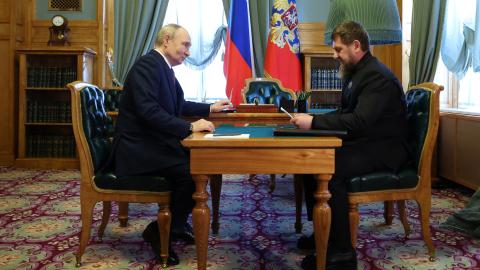Ramzan Kadyrov, the leader of Chechnya in southern Russia, was reported last week to have submitted a request to the Kremlin to be relieved of his post. Kadyrov was appointed by President Vladimir Putin in 2007, following in the footsteps of his father, Akhmad Kadyrov — a former Chechen rebel who defected to Russia in 1999 and became Chechen leader in 2003.
The relationship between Ramzan Kadyrov and Putin has long been transactional. The president gains a loyal lieutenant to govern one of Russia’s most volatile regions with an iron fist. In return, Kadyrov enjoys the Kremlin’s patronage, with Chechnya effectively subsidized by the Russian state. Kadyrov publicly demonstrates unwavering loyalty to Putin, while he and his inner circle operate with unchecked brutality.
If Kadyrov does step down, it could create a major problem for Putin at a time when he can least afford one. The motive is unclear. In the past, Kadyrov has threatened to resign to extract concessions and support from Moscow. This could be more of the same: days after he asked to quit, Kadyrov met Putin in Moscow with no public mention of stepping down. Alternatively, the request may be genuine and tied to long-rumored health issues. Reports suggest Kadyrov has spent extended periods in hospital, and recent social media videos show him slurring his words.
Whether real or tactical, it all comes at a particularly inconvenient moment for the Kremlin. Last week Moscow hosted a major celebration commemorating the Soviet Union’s victory in the Second World War. The event, in which several former Soviet republics took part, was intended to project strength and boost Putin’s global image amid the war in Ukraine. If Kadyrov is indeed sincere, and wants to relinquish power, his timing is disastrous from a public relations standpoint and could cause major practical problems for Putin.
Any power transition or vacuum in the North Caucasus is bound to alarm Moscow. To appreciate the significance, one must understand Russia’s historical relationship with the region.
Russia first sought to conquer the North Caucasus in the late 1700s, but full control was not achieved until 1864 after a prolonged and bloody resistance. Even then, uprisings continued for decades. In 1991, following the collapse of the Soviet Union, the Checheno-Ingush Autonomous Soviet Socialist Republic declared independence as the Chechen Republic of Ichkeria. Russia responded with military force and launched the First Chechen War (1994–1996), which ended in a Russian defeat and a fragile peace. This left Chechnya politically unstable but de facto independent.
In October 1999, newly appointed Prime Minister Vladimir Putin launched the Second Chechen War. By February 2000, Russian forces had all but destroyed the capital city Grozny, and over time Moscow displaced the Ichkerian leadership, replacing it with local allies loyal to the Kremlin. In 2009, Russia officially declared the war over. By that point, Ramzan Kadyrov had consolidated power and ruthlessly suppressed any dissent.
Since being forced out in the early 2000s, the Chechen Republic of Ichkeria has maintained a government-in-exile in Western Europe. Its Prime Minister, Akhmed Zakayev, was deputy prime minister and foreign minister in the days of the de facto republic. Today, much of this exiled government operates from Kyiv, with at least two Ichkerian Chechen units fighting alongside Ukrainian forces. It has also increased its diplomatic engagement, with Inal Sherip, the foreign minister, leading global outreach.
Given their combat experience in Ukraine and strong political motivation, this government-in-exile will seek a role in any future power vacuum in the North Caucasus if given an opportunity.
If Kadyrov does step down, a significant power struggle is likely to ensue over his successor. Different Russian power centers will push their preferred candidates. The outcome — whether a smooth, behind-the-scenes transition or a violent conflict — could significantly affect Russia’s internal stability.
The FSB, Russia’s main security service, is thought to support two possible successors: Magomed Daudov, Speaker of the Chechen parliament and a close Kadyrov ally, and Apti Alaudinov, commander of the Chechen special forces and a lieutenant general in the Russian army. The National Guard leadership is said to favor Adam Delimkhanov, a State Duma deputy and Kadyrov’s cousin.
A wildcard candidate is Musa Bazhaev, a Russian-Chechen businessman and president of Alliance Group, the massive Russian business conglomerate. He could appeal to the Kremlin with promises of economic development. It’s also possible that Kadyrov will attempt to keep leadership within his family by pushing for his 17-year-old son, Adam, to take over. Despite his youth, Adam has been given increasing responsibilities and oversees Chechen units in the National Guard as well as all police forces in the region. However, his age and lack of experience could be significant obstacles.
So what will Putin do? Don’t expect a quick decision. He is focused on negotiations with the White House over the war in Ukraine and will want to avoid adding another major crisis to his plate. Before accepting Kadyrov’s resignation, Putin will probably demand a clear succession plan to avoid destabilization. But with so many competing interests, preventing a power struggle — or even armed conflict — may be easier said than done.
History tells us that there is no reason to believe that a transition of power in Chechnya will be easy. While events there may seem peripheral to global policymakers, the region could quickly become central if Kadyrov’s succession does not go smoothly. Keep an eye on Chechnya in the coming weeks.



















